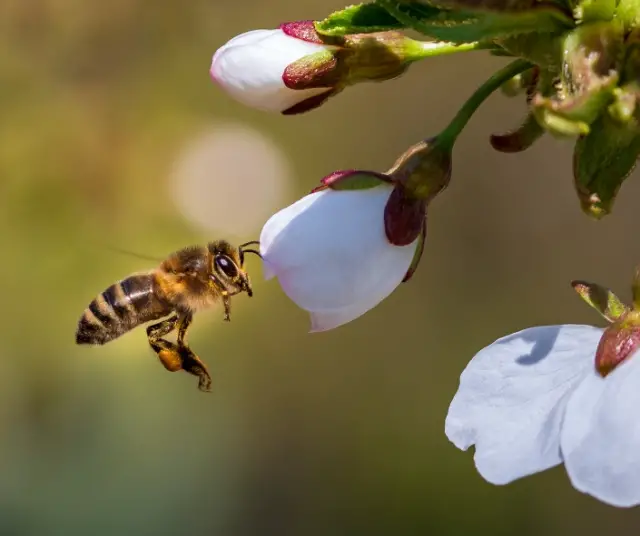Pollinators play a fundamental role in ecosystems and food production. These small living beings, such as bees, butterflies, wasps and other insects , are responsible for the transfer of pollen from one flower to another, which allows fertilization and the formation of fruits and seeds. Explore the importance of pollinators in nature and agriculture. From their role in the conservation of biodiversity to their contribution to food production, we will discover how these insects are key to our well-being and the balance of ecosystems.
Pollinators and Biodiversity
Pollinators play a vital role in preserving biodiversity. By visiting different flowers in search of nectar and pollen , they inadvertently transport pollen from one plant to another, allowing reproduction and the formation of new generations of plants. This pollination process is essential for the survival and growth of many plant species, including trees, shrubs, wildflowers, and agricultural crops. Furthermore, pollinators also contribute to the genetic diversity of plants by promoting gene mixing through the transfer of pollen between individuals. This genetic diversity is critical for plant adaptation to climate change, disease, and other environmental challenges.
Pollinators and Agriculture
In agriculture , pollinators play a crucial role in food production. It is estimated that at least 75% of the world's major agricultural crops depend to some extent on animal pollination. These crops include fruits, vegetables, nuts, seeds, and many oil plants.
Pollination by insects increases the quality and quantity of crops. When pollinators visit the flowers, efficient pollen transfer occurs, increasing the fertilization rate and favoring the production of larger, tastier fruits with higher seed content.
In many cases, animal pollination can significantly increase crop yields. Studies have shown that the presence of pollinators can increase crop yields by 20% or more. In addition, pollinated crops also often have greater resistance to diseases and pests, reducing the need to use agricultural chemicals.
Threats to Pollinators
Despite their importance, pollinators face numerous threats that endanger their survival. One of the main challenges is the loss and degradation of natural habitats due to urbanization, deforestation and intensive agriculture. The reduction of feeding and reproduction areas limits the availability of resources for pollinators and decreases their ability to carry out their pollination work. Additionally, the widespread use of pesticides in agriculture can have negative effects on pollinators. Pesticides, especially neonicotinoid insecticides, can affect the nervous systems of pollinators, weaken their immune systems, and reduce their ability to navigate and forage.
Another important factor is climate change , which alters flowering patterns and the availability of resources for pollinators. Variations in temperatures and rainfall can throw interactions between pollinators and plants out of sync, hindering their survival and affecting the reproduction of pollination-dependent species.
Pollinator Conservation
The conservation of pollinators is essential to maintain the health of ecosystems and guarantee food production. Here are some key measures that can be taken to protect these insects:
- Habitat Conservation: It is essential to conserve and restore natural habitats, such as grasslands, forests, and wilderness, that provide shelter, food, and resources for pollinators.
- Sustainable use of pesticides: The responsible use of pesticides should be promoted, limiting their application and opting for more pollinator-friendly alternatives, such as biological pest control methods.
- Encourage Plant Diversity : Planting a variety of flowering plants throughout the seasons ensures a constant source of food for pollinators. This can be achieved in gardens, parks and urban green spaces.
- Education and public awareness: It is important to inform and raise public awareness about the importance of pollinators and the measures they can take to protect them, such as avoiding the use of insecticides in gardens and providing food sources for pollinators in urban settings.
These are the main pollinators, it is worth clarifying that each of these are found many times in different regions of the world:
- Bees: Bees, both honey bees (Apis mellifera) and native bees, are the most efficient and well-known pollinators. They are responsible for pollinating a wide variety of plants, including agricultural crops and wildflowers.
- Butterflies: Butterflies also play an important role in pollination. They are attracted to nectar-bearing flowers and carry pollen on their bodies as they feed. Some species of butterflies, such as monarch butterflies, are especially known for their migrations and their contribution to plant pollination.
- Wasps: Although often feared for their sting, some species of wasps are also pollinators. Like bees and butterflies, they visit flowers in search of nectar and pollinate plants during their feeding process.
- Flies: Some species of flies, such as flower flies, also do pollination. They are attracted to the scent and nectar of flowers, and carry pollen from one flower to another as they feed.
- Beetles: Beetles are important pollinators in many regions of the world. Some beetle species, such as flower beetles, feed on pollen and nectar, and contribute to pollination by carrying pollen on their bodies.
It is everyone's responsibility to contribute to the conservation of pollinators through the protection of their habitats, the sustainable use of pesticides and the promotion of plant diversity. By protecting pollinators, we ensure the preservation of biodiversity and guarantee healthy and sustainable food production for future generations.
